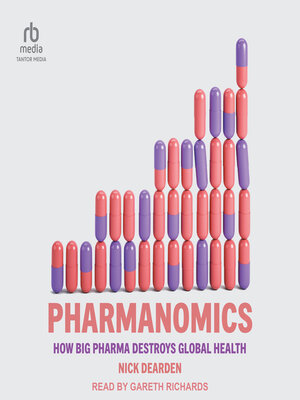
Sign up to save your library
With an OverDrive account, you can save your favorite libraries for at-a-glance information about availability. Find out more about OverDrive accounts.
Find this title in Libby, the library reading app by OverDrive.



Search for a digital library with this title
Title found at these libraries:
| Library Name | Distance |
|---|---|
| Loading... |
In Pharmanomics, investigative journalist Nick Dearden digs down into the way we produce our medicines and finds that Big Pharma is failing us, with catastrophic consequences.
Big Pharma is more interested in profit than health. This was made clear as governments rushed to produce vaccines during the Covid pandemic. Behind the much-trumpeted scientific breakthroughs, major companies found new ways of gouging billions from governments in the West while abandoning the Global South. But this is only the latest episode in a long history of financializing medicine—from Purdue's rapacious marketing of highly addictive OxyContin through Martin Shkreli's hiking the price of a lifesaving drug to the 4.5 million South Africans needlessly deprived of HIV/AIDS medication.
Since the 1990s, Big Pharma has gone out of its way to protect its property through the patent system. As a result, the business has focused not on researching new medicines but on building monopolies. This system has helped restructure our economy away from invention and production in order to benefit financial markets. It has fundamentally reshaped the relationship between richer and poorer countries, as the access to new medicines and the permission to manufacture them is ruthlessly policed. In response, Dearden offers a pathway to a fairer, safer system for all.
Big Pharma is more interested in profit than health. This was made clear as governments rushed to produce vaccines during the Covid pandemic. Behind the much-trumpeted scientific breakthroughs, major companies found new ways of gouging billions from governments in the West while abandoning the Global South. But this is only the latest episode in a long history of financializing medicine—from Purdue's rapacious marketing of highly addictive OxyContin through Martin Shkreli's hiking the price of a lifesaving drug to the 4.5 million South Africans needlessly deprived of HIV/AIDS medication.
Since the 1990s, Big Pharma has gone out of its way to protect its property through the patent system. As a result, the business has focused not on researching new medicines but on building monopolies. This system has helped restructure our economy away from invention and production in order to benefit financial markets. It has fundamentally reshaped the relationship between richer and poorer countries, as the access to new medicines and the permission to manufacture them is ruthlessly policed. In response, Dearden offers a pathway to a fairer, safer system for all.







